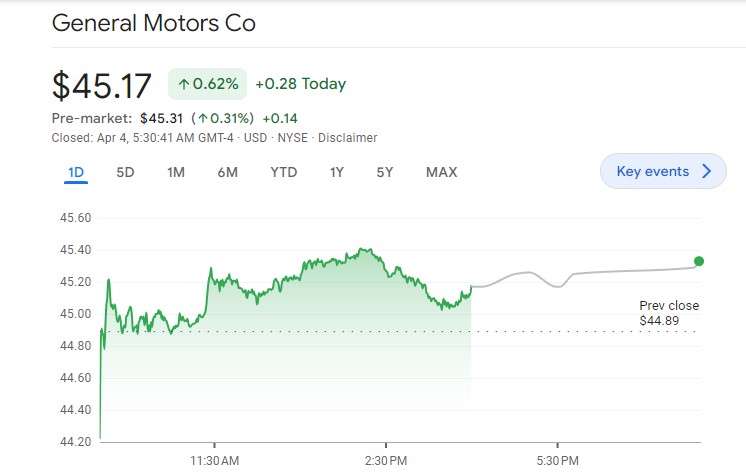General Motors experienced a 1.5% decrease in first-quarter U.S. vehicle sales compared to the previous year. The decline, resulting in 594,233 vehicles sold during the initial three months of the year, was primarily attributed to a 22.9% drop in sales to fleet customers, while retail sales to consumers rose by 6%.
The company’s sales figures were following estimates by Cox Automotive but fell short of industry-wide expectations. Cox Automotive had anticipated a 5.5% increase in U.S. auto industry sales compared to the previous year.
During the quarter, only the Buick brand under GM reported a sales upturn, marking a 16.4% increase from the previous year. Conversely, the GMC truck brand experienced a decrease of about 5%, while both Cadillac and Chevrolet saw declines of around 2%.
GM’s sales of full-size pickups reached approximately 197,000 units in the first quarter, reflecting a 3.6% increase from the previous year, marking the best performance since the first quarter of 2020.
Marissa West, President of GM North America, commented, GM gained retail market share year-over-year with strong mix and pricing, our inventories are in good shape heading into the spring, and production and deliveries of Ultium Platform EVs are rising, led by the Cadillac Lyriq. We’re on plan,”
Sales of Electric Vehicles
During the first quarter, sales of GM’s electric vehicles remained low, attracting close attention from Wall Street. These sales amounted to 16,425 units, constituting 2.8% of the automaker’s total sales for the period.

GM is currently increasing production of its latest electric vehicles, such as the Cadillac Lyriq and the Blazer EV while phasing out sales of Chevrolet Bolt models, which were discontinued in December.
Sales of the Blazer EV in the first quarter were constrained, reaching only 600 units. This limitation was due to a stop-sale from late December to early March, aimed at resolving software issues.
Other Automakers
Other automakers shared diverse outcomes for the first quarter, with inventories and sales stabilizing to levels reminiscent of pre-COVID-19 times.
Hyundai Motor America CEO Randy Parker highlighted the intensifying competition within the industry as automakers strive to sustain profits achieved in recent years without excessively subsidizing sales.

“The market is changing swiftly, and it’s gotten a lot more competitive,” Parker remarked during a media briefing on Tuesday.
Hyundai celebrated its highest March sales to date last month, with 76,920 vehicles sold. However, its first-quarter sales experienced only a marginal increase of 0.2% compared to the previous year.
Additionally, Hyundai’s luxury brand, Genesis, reported a first-quarter sales figure of 14,777 vehicles, marking a 7.3% year-over-year increase.
Here’s the performance of other major automakers in U.S. sales compared to the first quarter of 2023:
- Toyota Motor witnessed a notable 16% surge in sales, with a specific highlight being a 16.1% increase in March. The company achieved sales of nearly 388,000 vehicles throughout the year’s initial three months.
- Honda Motor demonstrated a robust 17.3% rise in sales, amounting to nearly 334,000 vehicles sold. March alone saw a 10.1% increase in sales for the company.
- Kia recorded sales of 179,621 vehicles during the first quarter, reflecting a slight decrease of 2.5% compared to the previous year.
- Nissan Group announced first-quarter sales of 252,735 vehicles, marking a solid 7.2% increase from the same period a year earlier.
- EV startup Rivian Automotive experienced a significant surge in vehicle deliveries, with 13,588 vehicles delivered during the first quarter, up from 7,946 in the previous year. The company reiterated its guidance for annual production, aiming for a total of 57,000 vehicles, including 13,980 vehicles in the first three months of the year.


